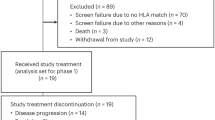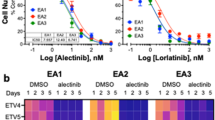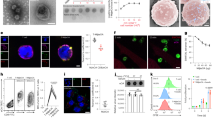Abstract
Multiple antitumor modalities may be necessary to overcome lung tumor-mediated immunosuppression and effectively treat non-small cell lung cancer (NSCLC). To evaluate a multimodality gene therapy approach for control of local tumor growth, a weakly immunogenic murine alveolar cell carcinoma, L1C2, was transduced with either the interleukin-7/hygromycin-herpes simplex thymidine kinase (IL-7/HyHSVtk) internal ribosome entry site (IRES) retroviral vector or a vector containing the HyHSVtk, but not the IL-7 gene. Of the many cytokines available for gene transfer, IL-7 was chosen for these studies because it both stimulates CTL responses and down-regulates tumor production of the immunosuppressive peptide TGF-β. Following selection in hygromycin, IL-7 transduction was confirmed by ELISA. Clones produced 1.25 to 10 ng of IL-7/ml/106 cells per 24 h. In vitro, genetically modified tumor cells were significantly more sensitive to ganciclovir (GCV) than unmodified parental tumor cells. The in vivo growth of ex vivo modified L1C2 cells was evaluated. There was a dose–response relationship between the amount of IL-7 secreted in vitro and the growth of genetically modified murine tumor in vivo. Transduced tumor cells regressed in mice following GCV therapy. Although ex vivo gene modification of tumor cells led to complete resolution of the tumor following implantation in vivo, IL-7 and HSVtk gene modified tumor cells were not effective in treating established parental tumors. However when 5 × 105 bone marrow-derived, in vitro activated dendritic cells (DC) were administered in combination with transduced tumor and GCV, 5 day old established tumors were eradicated in 80% of mice. These studies suggest that multicomponent vaccines may facilitate improved host responses by replacing host immune deficits and thus could have a role in adjuvant therapy and local control of NSCLC.
This is a preview of subscription content, access via your institution
Access options
Subscribe to this journal
Receive 12 print issues and online access
$259.00 per year
only $21.58 per issue
Buy this article
- Purchase on Springer Link
- Instant access to full article PDF
Prices may be subject to local taxes which are calculated during checkout
Similar content being viewed by others
Author information
Authors and Affiliations
Rights and permissions
About this article
Cite this article
Sharma, S., Miller, P., Stolina, M. et al. Multicomponent gene therapy vaccines for lung cancer: effective eradication of established murine tumors in vivo with interleukin-7/herpes simplex thymidine kinase-transduced autologous tumor and ex vivo activated dendritic cells. Gene Ther 4, 1361–1370 (1997). https://doi.org/10.1038/sj.gt.3300531
Received:
Accepted:
Issue Date:
DOI: https://doi.org/10.1038/sj.gt.3300531
Keywords
This article is cited by
-
Intratumor injection of CCL21-coupled vault nanoparticles is associated with reduction in tumor volume in an in vivo model of glioma
Journal of Neuro-Oncology (2020)
-
Liposome-polycation-DNA (LPD) particle as a carrier and adjuvant for protein-based vaccines: Therapeutic effect against cervical cancer
Cancer Immunology, Immunotherapy (2005)
-
Enhanced antitumor effects of a bicistronic adenovirus vector expressing both herpes simplex virus thymidine kinase and monocyte chemoattractant protein-1 against hepatocellular carcinoma
Cancer Gene Therapy (2003)



